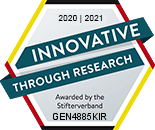Always on the Cutting Edge: Research Projects From genua
In the field of IT security, there is often no direct path to the goal. The problems are usually complex and a great deal of know-how, experience and persistence are required to find intelligent solutions. But this is precisely what excites us – and the research results enable the development of useful innovations time and again to better safeguard modern information technology.
To find truly good solutions, it is often useful to bundle various competences, perspectives and resources. It is for this reason that genua participates in research projects: Here, we work together with universities, research institutes and other companies to solve fundamental problems in the area of IT security. Participants exchange and discuss know-how, with all sides benefiting from the collectively produced results. The sponsored projects thereby make an important contribution to the transfer of knowledge and strengthen Germany as a research and business location.
Quantum Safe Software Supply Chain
AMiQuaSy
In the AMiQuaSy project, genua and its consortium partners XITASO GmbH and Ostbayerische Technische Hochschule Amberg-Weiden are investigating how the security processes of today's IT systems can be quickly adapted in the future to protect them against attacks from quantum computers.
A central component of this project is the migration to quantum-resistant processes and mechanisms in the context of secure software development.
The project is funded by the Federal Ministry of Education and Research.
Duration: Mai 2023 to April 2026
Further information about the project
Insights
AMiQuaSy: Quantum Safe Software Supply Chain Based on CI/CD Platforms
READ ARTICLE
Federal Ministry of Education and Research
Research for Secure Software Development in the Post-Quantum World
(German article)
READ ARTICLE



